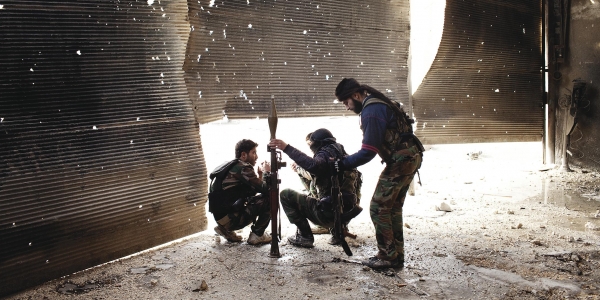A fascinating read and not what I would have expected from the Chronicle of Higher Education. Professor Ginsberg's new book will be going on my reading list. This certainly makes an indirect argument for the importance of Security Studies. (and for those in SSP this might make a useful read for 500 and 501)
August 12, 2013
Why Violence Works

Franco Pagetti, VII
Syrian rebels launch a rocket-propelled grenade against an army position in Aleppo.
By Benjamin Ginsberg
Humans, and perhaps their prehuman ancestors, have engaged in murder and mayhem, as individuals and in groups, for hundreds of thousands of years. And, at least since the advent of recorded history, violence and politics have been intimately related. Nation-states use violence against internal and external foes. Dissidents engage in violence against states. Competing political forces inflict violence on one another. Writing in 1924, Winston Churchill declared—with good reason—that "the story of the human race is war."
Some writers see violence as an instrument of politics. Thomas Hobbes regarded violence as a rational means to achieve such political goals as territory, safety, and glory. Carl von Clausewitz famously referred to war as the continuation of politics by other means. A second group of writers view violence as a result of political failure and miscalculation. The title of an influential paper on the origins of the American Civil War by the historian James Randall, "The Blundering Generation," expresses that idea. A third group, most recently exemplified by the Harvard psychologist Steven Pinker, regards violence as a pathological behavior that is diminishing in frequency with the onward march of civilization. Some proponents of that perspective have even declared that violence is essentially a public-health problem. Whatever their differences, each of these perspectives assigns violence a subordinate role in political life.
The West's global dominance for most of the past millennium is in large part a function of its capacity for violence.
But there is an alternative view, one that assigns violence a primary role in politics. This outlook is implied by Mao Zedong's well-known aphorism that political power "grows out of the barrel of a gun." Violence, in other words, is the driving force of politics, while peaceful forms of political engagement fill in the details or, perhaps, merely offer post-hoc justifications for the outcomes of violent struggles. Mao corrected Clausewitz by characterizing politics as a sequel to or even an epiphenomenon of violence—a continuation of violence by other means.
Unfortunately, Mao seemed to have an inordinate fondness for bloodshed. After all, he suggested that the quality of a revolutionary should be judged by the number of people he has killed. Yet our revulsion at Mao's practices should not blind us to the accuracy of his observation. Violence and the threat of violence are the most potent forces in political life.
People say that problems cannot be solved by the use of force, that violence, as the saying goes, is not the answer. That adage appeals to our moral sensibilities. But whether or not violence is the answer depends on the question being asked. For better or worse, violence usually provides the most definitive answers to three major questions of political life: statehood, territoriality, and power. Violent struggle—war, revolution, terrorism—more than any other immediate factor, determines what nations will exist and their relative power, what territories they occupy, and which groups will exercise power within them.
In the case of statehood, there are occasional circumstances when a state may be built and endure mainly through peaceful means. The peaceful divorce of Slovakia and the Czech Republic is an example. This is, however, one of the rare exceptions. As the social scientist Charles Tilly has observed, most regimes are the survivors or descendants of a thousand-year-long culling process in which those states capable of creating and sustaining powerful militaries prevailed, while those that could not or would not fight were conquered or absorbed by others. Similarly, when it comes to control of territory, virtually every square inch of inhabited space on the planet is occupied by groups that forcibly dispossessed—sometimes exterminated—the land's previous claimants.
The meek, in short, have not inherited very much of the earth. Indeed, the West's global dominance for most of the past millennium is in large part a function of its capacity for violence.
(Continued at the link below)
No comments:
Post a Comment